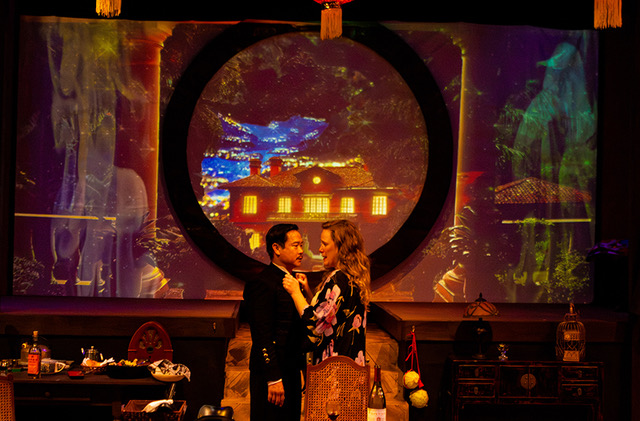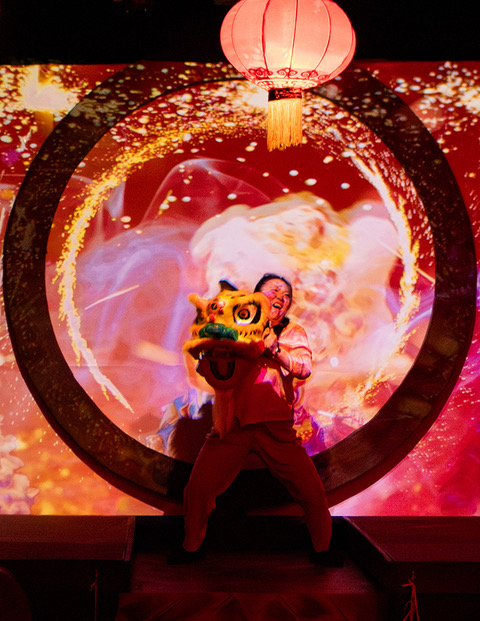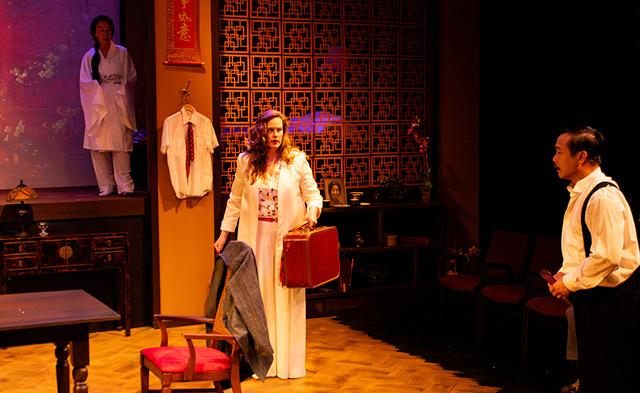PICT’s ‘Miss Julie: A Spectacular Adaptation Set For Now and All Time

Among the pantheon of modern playwrights, August Strindberg helped create the genre of naturalism, a movement established by Emile Zola in the world of literary fiction. Zola proposed a few principles to follow. One was to limit the elements of storytelling and thus minimize the number of characters necessary to tell that story. Strindberg’s Miss Julie, first written in 1888 and adapted countless times since, calls for just three characters: the headstrong Miss Julie, of course, John, her father’s valet, and John’s erstwhile love interest, Christine, a cook whose kitchen serves as the singular set.
One of the more recent adaptations of the play, Amy Ng’s Miss Julie, now playing at Carnegie Stage and produced by PICT, sets the action in the Governor’s mansion when Britain held tenuous rule of Hong Kong following the aftermath of World War II. The action of the play takes course over one night and morning during the Chinese New Year. While cultural tensions are high outside the estate, so too is the welcome spirit of new beginnings, here celebrated with fireworks, fine rice wine and truly colorful Asian cuisine.
Amy Ng’s adaptation clings closely to Strindberg’s plot. Recently jilted in her engagement to a suitable gentleman, Miss Julie finds herself alone and depressed while others around her attend the festivities of the new year. Scandalously, after breaking with her fiance, she dances with the house servants including her father’s valet John (who Ng here has as a chauffeur), a Cantonese Christian who has otherwise planned to take the occasion to propose to Christine. We learn that Julie’s deceased Mom, once a missionary, has raised her always to doubt male authority and, indeed, it seems Julie has a history of testing such authority. That rings particularly true as the action picks up pace. Her purebred dog has been impregnated by a farmhand’s mongrel, and so she has instructed Christine to brew a pungent concoction with which to help her bitch miscarry. Julie also has a caged canary who she calls “her one best friend.” With these evident symbols of Darwinism, we see that Miss Julie and John struggle in their relationship—both societal and sexual—to determine who, by their very different upbringings, is more fit to survive in an ever-changing environment affected by war, civil strife and persistent colonialism.

Of dozens of adaptations of Strindberg’s classic tale—quite notably Pittsburgh playwright Mark Clayton Southers recently adapted it with multiracial characters, entitled Miss Julie, Clarissa and John—Amy Ng’s more conservative version hews well to this historic Hong Kong setting. Inherent in her perspective is the homage these characters must pay to variations of Chinese custom, Catholic tradition, cultural tastes, and even their preference of music.
PICT’s incredible production plays out in 90 minutes with no intermission. As such, every scene calls for purposeful action—there’s food to serve, clothes to purchase, flowers to arrange, and the ever-present boots that John must shine for his master—and, too, every scene sizzles with subtle psychology. Pittsburgh audiences witnessing this American premiere of Strindberg’s most produced play are in for some deep conflict of character and clashes of culture, promising rich catharsis. Ng’s adaptation is both relevant and welcome.
There is so much that proves brilliant in PICT’s production. One most particularly is the inclusion of a fourth character, simply referred to as Auntie. She has no lines, has no part in moving the plot forward, but like a ghost of dynasties past, she hovers over scenes to remind us that the class struggle witnessed here on stage is grossly short-sighted in perspective. Auntie plays the traditional Chinese stringed erhu. And she does so masterfully. The music, albeit unfamiliar to modern ears, is a haunting reminder that the battle of the sexes—if not just the frailty of mankind—is both ancient and forever. Mimi Jong who beautifully wisps across the stage as Auntie may be worth the entire dramatic experience of this spectacular production.

No less fortunate are we to have two exceptional talents to take on the demanding roles of Miss Julie and John. They are Shelby Garrett and Trieu Tran. Ms. Garrett has a commanding stage presence, in part enabled by her height (compared to others on stage) but primarily by dint of her character who mostly commands (if not causes) the entirety of Strindberg’s natural drama. Ms. Garrett has a clear future ahead of her. By comparison, Mr. Tran’s John must be quick to react, yet remain subtle in his affections. He is an accomplished veteran of stage, film and TV screen. His deep resume of dramatic roles from Shakespeare to “Malcolm in the Middle” is evident on this stage. Yan Pang plays wonderfully as the dutiful Christine and is as appealing on stage as she is in keeping John’s affections. Kudos to her good work.
Yet, there is much for which director Elizabeth Elias Huffman should be praised, too. First, a production such as this is the culmination of much collaboration. Huffman found this recent adaptation, reached out to playwright Ng, and then sought the support of many local collaborators to bring authenticity to the Asian culture so critical to this retelling. No one witnessing this success will forget the inclusion of Auntie with her solemn erhu. Nor will they forget a brilliant, yet simple set which requires capable blocking (and, yes, some elegant choreography) to make this adaptation as universally relevant as it is charming in very specific details. I believe PICT will be forever proud of this American premiere.
Let’s not exclude honors deserving of many other professionals who contributed to this great show. Exceptional credit is due Tucker Topel for the all-brilliant set, as well as to lighting designer Bob Steinbeck. Audiences will be absolutely floored by the video projections which help claim the setting for the governor’s mansion, define many cultural symbols, excite the new year celebration, and reflect a full complement of imagery that no one might expect on such an intimate stage. Natalie Rose Mabry’s projection designs are just awesome. Further credits are due Elizabeth Huffman for costume design (which is a critical component to the story,) and to Tomé Cousin who directed the “intimacy” of the principal stage roles. Sound design is by Steve Shapiro and properties are by Alex Keplar. Melissa Hill Grande is Production Manager, Gabriella Walker managed the stage, and was assisted by Caroline Hall.
Seats are limited in this intimate theater space, so tickets will sell quickly. PICT’s Miss Julie runs now until May 4 at Carnegie Stage, 25 W. Main Street, Carnegie.
Photo Credit: natalierosemabry.art
C. Prentiss Orr is a Pittsburgh-based writer who covers theater and other topics for Entertainment Central. He is the author of the books The Surveyor and the Silversmith and Pittsburgh Born, Pittsburgh Bred.
Share on Social Media
Follow Entertainment Central
Latest Stories
Sign up for the EC Newsletter







